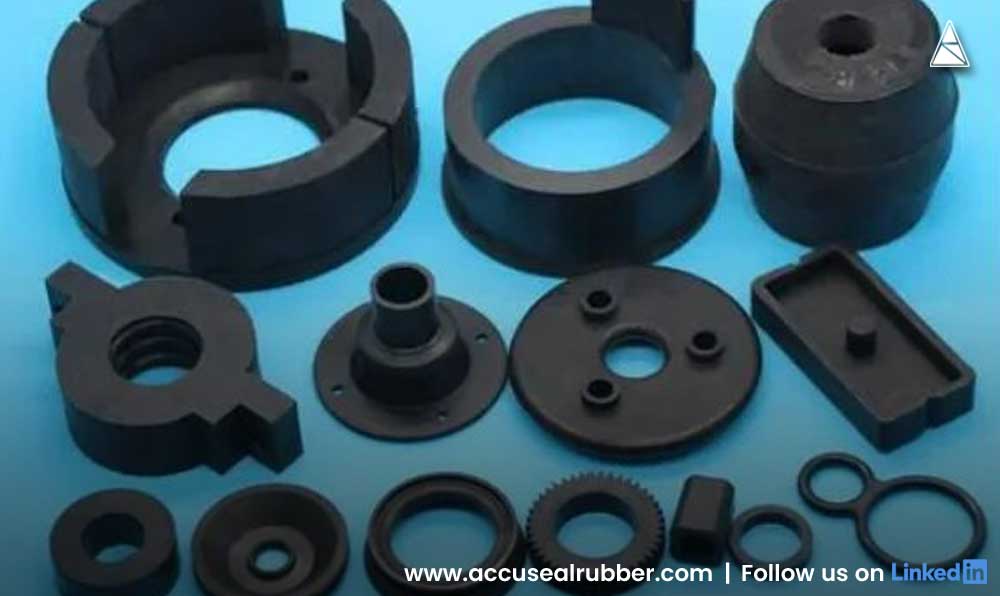Custom rubber molding is an essential manufacturing process used to create high-precision rubber components for various industries. Whether for automotive, medical, or industrial applications, custom rubber parts ensure durability and functionality. In this blog, we’ll explore everything you need to know about custom rubber molding, including the process, benefits, material choices, and industry applications.
What Is Custom Rubber Molding?
Custom rubber molding is a process where raw rubber materials are shaped into specific parts using molds. This allows manufacturers to create rubber products that meet precise design specifications, ensuring consistency and quality.
The Custom Rubber Molding Process
The rubber molding process consists of several key steps:
-
Material Selection – Choosing the right rubber material based on the application.
-
Mold Design & Fabrication – Creating a custom mold tailored to the product’s specifications.
-
Molding Process – Shaping the rubber using one of three primary methods:
-
Compression Molding: Rubber is placed in a mold cavity and compressed to shape.
-
Injection Molding: Heated rubber is injected into a mold to form complex parts.
-
Transfer Molding: A combination of compression and injection molding, where rubber is forced into the mold under pressure.
-
-
Curing & Cooling – The rubber is allowed to cure and harden into its final shape.
-
Trimming & Finishing – Excess rubber is trimmed, and quality inspections are performed.
Types of Rubber Used in Custom Molding
Selecting the right rubber material is crucial for durability and performance. Common rubber types include:
-
Natural Rubber (NR): High elasticity and tear resistance.
-
Silicone Rubber: Ideal for high-temperature and medical applications.
-
EPDM: Excellent weather resistance for outdoor applications.
-
Nitrile Rubber (NBR): Resistant to oils and fuels.
-
Neoprene: Good chemical and flame resistance.
Benefits of Custom Rubber Molding
Custom rubber molding offers numerous advantages, including: ✔ Precision & Customization: Molds are designed to exact specifications. ✔ Durability: Rubber components withstand extreme conditions. ✔ Cost-Effectiveness: Ideal for high-volume production. ✔ Versatility: Used in various industries such as automotive, aerospace, and medical.
Common Applications of Custom Rubber Molding
Custom-molded rubber parts are found in numerous applications, including: ✅ Automotive: Seals, gaskets, and hoses. ✅ Medical & Healthcare: Silicone components for medical devices. ✅ Industrial Machinery: Vibration dampeners and protective covers. ✅ Aerospace & Defense: High-performance rubber seals. ✅ Electronics: Insulated rubber components for electrical safety.
How to Choose the Right Rubber Material
The best material depends on the application’s specific needs. Factors to consider include:
-
Temperature Resistance – Does the rubber need to withstand extreme heat or cold?
-
Chemical Exposure – Will the part be exposed to oils, chemicals, or harsh environments?
-
Mechanical Stress – How much wear and tear will the part experience?
Consulting with an expert can help you choose the best rubber material for your project.
Quality Control in Custom Rubber Molding
Quality assurance is essential in rubber molding. Manufacturers follow strict guidelines to ensure: ✔ Material durability and strength testing. ✔ Precision molding for exact specifications. ✔ Post-production inspections for defects. ✔ Compliance with industry certifications and standards.
Cost Factors in Custom Rubber Molding
The cost of custom rubber molding depends on several factors: 💰 Material Selection: Some rubber compounds are more expensive than others. 💰 Mold Complexity: More intricate molds require higher manufacturing costs. 💰 Production Volume: Bulk orders reduce per-unit costs. 💰 Post-Processing Needs: Additional finishing or treatments increase costs.
Prototyping with Custom Rubber Molding
Custom rubber molding is often used for prototyping. This allows businesses to test a design before committing to large-scale production, reducing risks and ensuring a better final product.
Why Work with Accuseal Rubber Inc.?
For precision-engineered rubber products, Accuseal Rubber Inc. provides top-quality custom rubber molding solutions. With expertise in material selection, advanced molding techniques, and strict quality control, they deliver reliable, high-performance rubber components tailored to your needs.
For more details on custom rubber molding and expert guidance on your project, contact Accuseal Rubber Inc. today!
Conclusion
Custom rubber molding is an invaluable process for creating durable, high-quality rubber components across various industries. Understanding the different molding methods, material choices, and applications will help you make informed decisions when developing rubber parts for your business.

 Nick Parker
Nick Parker